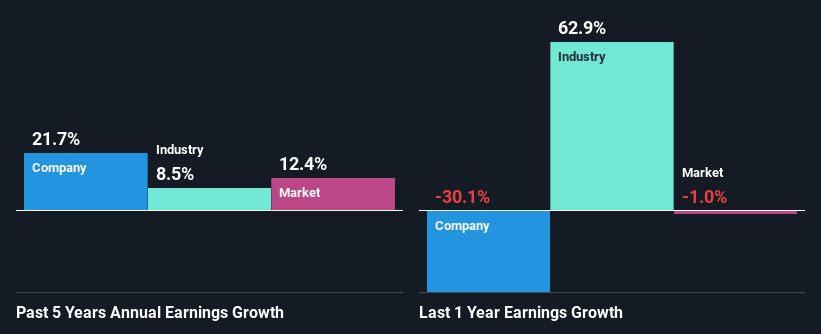Stock Analysis
- United Kingdom
- /
- Household Products
- /
- LSE:RKT
Reckitt Benckiser Group plc (LON:RKT) Stock Has Shown Weakness Lately But Financials Look Strong: Should Prospective Shareholders Make The Leap?

Reckitt Benckiser Group (LON:RKT) has had a rough three months with its share price down 26%. However, a closer look at its sound financials might cause you to think again. Given that fundamentals usually drive long-term market outcomes, the company is worth looking at. Specifically, we decided to study Reckitt Benckiser Group's ROE in this article.
Return on equity or ROE is an important factor to be considered by a shareholder because it tells them how effectively their capital is being reinvested. Simply put, it is used to assess the profitability of a company in relation to its equity capital.
View our latest analysis for Reckitt Benckiser Group
How Is ROE Calculated?
Return on equity can be calculated by using the formula:
Return on Equity = Net Profit (from continuing operations) ÷ Shareholders' Equity
So, based on the above formula, the ROE for Reckitt Benckiser Group is:
19% = UK£1.6b ÷ UK£8.5b (Based on the trailing twelve months to December 2023).
The 'return' is the profit over the last twelve months. So, this means that for every £1 of its shareholder's investments, the company generates a profit of £0.19.
What Has ROE Got To Do With Earnings Growth?
Thus far, we have learned that ROE measures how efficiently a company is generating its profits. Depending on how much of these profits the company reinvests or "retains", and how effectively it does so, we are then able to assess a company’s earnings growth potential. Assuming everything else remains unchanged, the higher the ROE and profit retention, the higher the growth rate of a company compared to companies that don't necessarily bear these characteristics.
Reckitt Benckiser Group's Earnings Growth And 19% ROE
At first glance, Reckitt Benckiser Group seems to have a decent ROE. Especially when compared to the industry average of 10% the company's ROE looks pretty impressive. This probably laid the ground for Reckitt Benckiser Group's significant 22% net income growth seen over the past five years. However, there could also be other causes behind this growth. For example, it is possible that the company's management has made some good strategic decisions, or that the company has a low payout ratio.
As a next step, we compared Reckitt Benckiser Group's net income growth with the industry, and pleasingly, we found that the growth seen by the company is higher than the average industry growth of 8.5%.

Earnings growth is an important metric to consider when valuing a stock. It’s important for an investor to know whether the market has priced in the company's expected earnings growth (or decline). By doing so, they will have an idea if the stock is headed into clear blue waters or if swampy waters await. Is Reckitt Benckiser Group fairly valued compared to other companies? These 3 valuation measures might help you decide.
Is Reckitt Benckiser Group Efficiently Re-investing Its Profits?
Reckitt Benckiser Group's significant three-year median payout ratio of 56% (where it is retaining only 44% of its income) suggests that the company has been able to achieve a high growth in earnings despite returning most of its income to shareholders.
Besides, Reckitt Benckiser Group has been paying dividends for at least ten years or more. This shows that the company is committed to sharing profits with its shareholders. Based on the latest analysts' estimates, we found that the company's future payout ratio over the next three years is expected to hold steady at 59%. Still, forecasts suggest that Reckitt Benckiser Group's future ROE will rise to 29% even though the the company's payout ratio is not expected to change by much.
Summary
In total, we are pretty happy with Reckitt Benckiser Group's performance. In particular, its high ROE is quite noteworthy and also the probable explanation behind its considerable earnings growth. Yet, the company is retaining a small portion of its profits. Which means that the company has been able to grow its earnings in spite of it, so that's not too bad. Having said that, the company's earnings growth is expected to slow down, as forecasted in the current analyst estimates. To know more about the company's future earnings growth forecasts take a look at this free report on analyst forecasts for the company to find out more.
Valuation is complex, but we're helping make it simple.
Find out whether Reckitt Benckiser Group is potentially over or undervalued by checking out our comprehensive analysis, which includes fair value estimates, risks and warnings, dividends, insider transactions and financial health.
View the Free AnalysisHave feedback on this article? Concerned about the content? Get in touch with us directly. Alternatively, email editorial-team (at) simplywallst.com.
This article by Simply Wall St is general in nature. We provide commentary based on historical data and analyst forecasts only using an unbiased methodology and our articles are not intended to be financial advice. It does not constitute a recommendation to buy or sell any stock, and does not take account of your objectives, or your financial situation. We aim to bring you long-term focused analysis driven by fundamental data. Note that our analysis may not factor in the latest price-sensitive company announcements or qualitative material. Simply Wall St has no position in any stocks mentioned.

Simply Wall St
About LSE:RKT
Reckitt Benckiser Group
Reckitt Benckiser Group plc manufactures and sells health, hygiene, and nutrition products worldwide.
Established dividend payer and good value.
